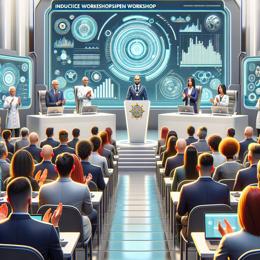Image created by AI
The Perilous Intersection of Politics and Education: SAHRC's Critical Race Theory Concerns
The South African Human Rights Commission (SAHRC) has recently taken a contentious shift in its approach to education and human rights under the guidance of Professor Tshepo Madlingozi. This new direction has alarmed various stakeholders in the field of education, casting doubts on the long-term implications for learner rights and institutional integrity.
On 22 October 2024, Madlingozi, known for his overtly critical stance against South Africa's liberal constitutional framework, led a significant workshop with the Western Cape Education Department (WCED). This has raised concerns about the permeation of Critical Race Theory (CRT) within educational policies and practices. Madlingozi’s views strongly advocate for a radical overhaul of the current educational system to address what he terms the "National Question," through restitution, redress, and redistribution—fundamental elements coated with a Marxist ideological undertone.
Concurrently, the SAHRC appears to be grappling with internal dysfunction as reports suggest it has become a battleground for political factionalism. These reports include allegations of report tampering and unprofessional behavior by high-ranking officials, which undermines the commission's credibility and its constitutional duty.
The involvement of the Institute for Justice and Reconciliation (IJR) in educational initiatives also aligns with the broader adoption of Critical Race Theory. They propose systemic changes to combat what they describe as pervasive institutional racism within schools. This approach resonates with the principles promoted by Robin DiAngelo, whose influence in South African educational reforms has been widely criticized for fostering division rather than inclusivity.
The SAHRC and WCED's commitment to addressing inequality and racism in schools might open doors for potentially prejudiced workshops and policies that could influence future educational content and teacher hiring. Such radical changes could realign South African education with contentious racial politics, shifting away from empirically grounded educational strategies.
This development poses a crucial challenge for the WCED and other stakeholders who advocate for a balanced and legally sound approach to education. There is a pressing need for the WCED to firmly articulate its stance against the underlying principles of CRT that do not align with the broader goals of equitable and non-partisan education.
As South Africa continues to navigate its complex historical and racial landscape, the role of entities like the SAHRC is pivotal in shaping a just society. However, as this case illustrates, when such bodies are swept into ideological tides, the risks posed to educational integrity and societal cohesion are profound. The resolution to these challenges lies in sustained, transparent, and principled engagements by all stakeholders in the educational sector to ensure that reform efforts genuinely align with the democratic values enshrined in the South African Constitution.










